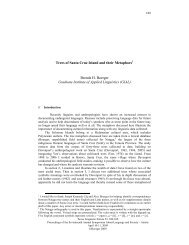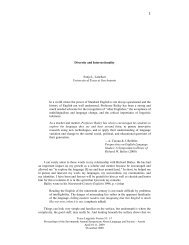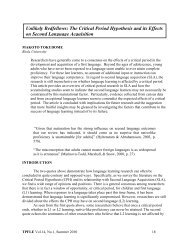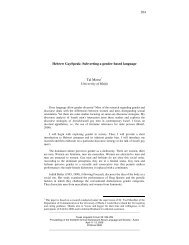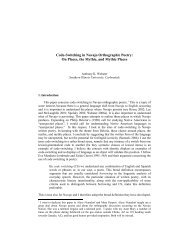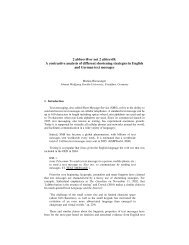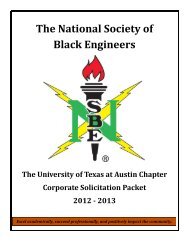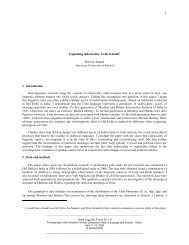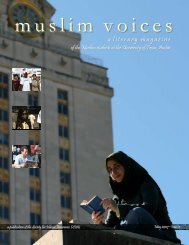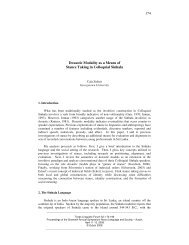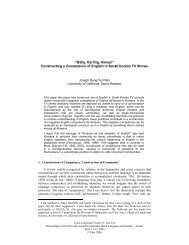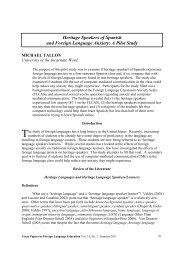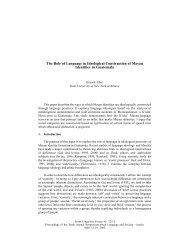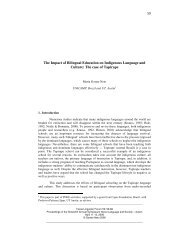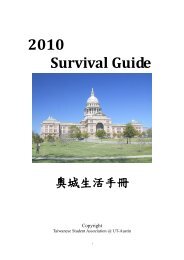The Effects of Computer-Mediated Communication on Foreign ...
The Effects of Computer-Mediated Communication on Foreign ...
The Effects of Computer-Mediated Communication on Foreign ...
You also want an ePaper? Increase the reach of your titles
YUMPU automatically turns print PDFs into web optimized ePapers that Google loves.
felt more relaxed during this activity” (p. 94). She c<strong>on</strong>cluded that both modes <str<strong>on</strong>g>of</str<strong>on</strong>g> CMC (i.e.,<br />
ACMC and SCMC) created a n<strong>on</strong>threatening atmosphere and lowered the affective filter.<br />
<str<strong>on</strong>g>The</str<strong>on</strong>g> Spanish students in Lee‟s (2004) study <str<strong>on</strong>g>of</str<strong>on</strong>g> <strong>on</strong>line discussi<strong>on</strong>s experienced anxiety<br />
when communicating with native speakers at the beginning <str<strong>on</strong>g>of</str<strong>on</strong>g> the semester, as they felt that their<br />
limited Spanish did not allow them to fully express their ideas. <str<strong>on</strong>g>The</str<strong>on</strong>g>y were also afraid to make<br />
mistakes.<br />
Heritage Students <str<strong>on</strong>g>of</str<strong>on</strong>g> Spanish<br />
A heritage student refers to “a language student who is raised in a home where a n<strong>on</strong>-<br />
English language is spoken, who speaks or at least understands the language, and who is to some<br />
degree bilingual in that language and in English” (Valdés 2001). <str<strong>on</strong>g>The</str<strong>on</strong>g>re are several reas<strong>on</strong>s to<br />
focus <strong>on</strong> heritage students, especially heritage students <str<strong>on</strong>g>of</str<strong>on</strong>g> Spanish. According to Campbell &<br />
Peyt<strong>on</strong> (1997), “Interest in this student populati<strong>on</strong> has been triggered by major demographic<br />
changes in this country…Most heritage language speakers (43 percent) are Hispanic<br />
Americans…This group is now the fastest growing and most diverse populati<strong>on</strong> group in the<br />
United States” (p. 38). C<strong>on</strong>sequently, their enrollments in universities are picking up all over the<br />
country. Fishman (1966) argues that heritage languages are a nati<strong>on</strong>al resource that should be<br />
preserved and encouraged. Van Deusen-Scholl (2003) states: “<str<strong>on</strong>g>The</str<strong>on</strong>g> events <str<strong>on</strong>g>of</str<strong>on</strong>g> September 11,<br />
2001, underscored the critical need for language competence in strategic languages…Given the<br />
nati<strong>on</strong>‟s expressed need for strategic linguistic competence, rethinking the role that heritage<br />
learners can play is advisable” (p. 215).<br />
Draper & Hicks (2000) note that “heritage language learners are different from the<br />
traditi<strong>on</strong>al foreign language student” (p. 20), and, therefore, “the instructi<strong>on</strong>al goals <str<strong>on</strong>g>of</str<strong>on</strong>g> the<br />
heritage learner may clash with those <str<strong>on</strong>g>of</str<strong>on</strong>g> the program in which they seek instructi<strong>on</strong>” (Van<br />
Deusen-Scholl, 2003, p. 223). This has led researchers to try to develop a theoretical foundati<strong>on</strong><br />
for heritage language instructi<strong>on</strong> (Valdés, 2001).<br />
Webb and Miller (2000) point out that heritage language students are pr<str<strong>on</strong>g>of</str<strong>on</strong>g>icient in their<br />
language in ways that foreign language learners, and sometimes even their foreign language<br />
teachers, are not and may never be. At the same time, they may have gaps in their knowledge <str<strong>on</strong>g>of</str<strong>on</strong>g><br />
their heritage languages that foreign language learners do not have, and these gaps prevent them<br />
from performing certain kinds <str<strong>on</strong>g>of</str<strong>on</strong>g> communicative tasks, reading and writing in particular. As a<br />
result, when teachers attempt to apply a standard foreign language curriculum and foreign<br />
language teaching strategies to the teaching <str<strong>on</strong>g>of</str<strong>on</strong>g> a heritage language, it can lead to discomfort, if<br />
not frustrati<strong>on</strong> and failure, for both students and teachers alike. <strong>Foreign</strong> language learners and<br />
heritage language learners are two different groups <str<strong>on</strong>g>of</str<strong>on</strong>g> students, each with their own needs.<br />
Campbell and Rosenthal (2000) provide several characteristics <str<strong>on</strong>g>of</str<strong>on</strong>g> a “typical” heritage<br />
language learner: (1) they have acquired nearly 90% <str<strong>on</strong>g>of</str<strong>on</strong>g> the ph<strong>on</strong>ological system <str<strong>on</strong>g>of</str<strong>on</strong>g> their<br />
ancestral language; (2) they have acquired 80% to 90% <str<strong>on</strong>g>of</str<strong>on</strong>g> the grammatical rules; (3) they have<br />
acquired extensive vocabularies, although the semantic range is limited to a few sociocultural<br />
domains; (4) they have typically acquired appropriate sociolinguistic rules; (5) they have learned<br />
and adopted many <str<strong>on</strong>g>of</str<strong>on</strong>g> the customs, values, and traditi<strong>on</strong>s (i.e., the culture) <str<strong>on</strong>g>of</str<strong>on</strong>g> their community; (6)<br />
they rarely have opportunities to gain literacy skills in their ancestral languages; and (7) they<br />
present a wide range <str<strong>on</strong>g>of</str<strong>on</strong>g> reas<strong>on</strong>s for wanting to study their ancestral languages. It should be noted<br />
that their proposed hypotheses need to be validated by empirical evidence collected from both<br />
heritage students and n<strong>on</strong>-heritage students in future research.<br />
Peyt<strong>on</strong>, Ranard and McGinnis (2001) make the point that heritage language learners also<br />
differ from traditi<strong>on</strong>al foreign language learners in that many heritage language learners are<br />
FOREIGN LANGUAGE ANXIETY AND CMC 43



